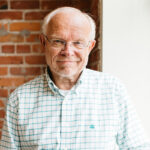Tell me your story
Whether you read novels or prefer Netflix movies, the story is the center of both genres. We could call them the curriculum for those writers. As a good novel unfolds with unexpected twists and surprising turns of a plot, so the biography of one’s life unfolds. Where it will lead is not always clear until more of the story develops.
The deepest truth of spirituality is always autobiographical. It is incarnational, lived in the grit of life on Monday and Tuesday, and all the days of the week. “My drifting is consecrated in pilgrimage.”[1] The gentle and probing questions of a mentor draw us to the central action of spirituality: to pay attention for the presence of God in everything.
The canvas of our biographies
The word biography comes from two words that describe the incarnational canvas of our stories: what is written (graphia) on our living cells (bios). There is a story that is being written in our lives, a composition that gets written down or painted on the canvas of our biographies. The discipline needed, therefore, is simple: We must learn to pay attention. Spiritual mentoring helps us pay attention to our story in order to recognize the already present action of God.
You know, we, as a culture, have developed a keen but misguided ability to live with distraction. Our society is busy with words everywhere and little hearing. The outcome? We become inattentive to the holy whispers from God, and sometimes, events of rich significance are being lived in our personal history. Mentoring helps transform mere chronology into sacred story, mere biography into spiritual autobiography.
We need a song to sing, a story to tell, a dance to dance so that we know where we are and who we are. But we seem to have lost the art of storytelling and dreaming, singing bits and pieces of what we know, and telling snatches of half remembered stories is better than nothing. The more we sang until the old, old story, the less we shall be satisfied with psychological and spiritual junk food, with false and temporary means of embodiment… there’s an overall theme played in the heart of God. We have to listen to that tune and chair in the larger drama if we were to make sense of our own.[2]
The most ordinary parts of your story
If we understand that, we come to a profound realization: everything is a container of the holy. An old Russian proverb says, “Every day can be a messenger of God.”
The great spiritual writer Eugene Peterson cautioned us against overusing the words spiritual, spirituality, and spiritual mentoring. These are all synonyms he would have said simply to the notion of life, life, and more life. There is a question I love to ask mentees. It is an African greeting, one that requires more than a nod in passing: “Are you at peace?” To answer is to tell the most ordinary parts of your story.
Tell me your story—the consistent question of mentoring.
Practice:
Are you at peace? Take a moment to journal your response.
_______________________________

Keith Anderson, D.Min., is a Faculty Associate for Spirituality and Vocation at VantagePoint3 and President Emeritus of Seattle School of Theology and Psychology and is the author of several books, including Reading Your Life’s Story (IVP, 2016), A Spirituality of Listening (IVP, 2016), and Spiritual Mentoring (IVP, 1999). Keith’s newest book, On Holy Ground: Your Story of Identity, Belonging and Sacred Purpose, will soon be released from Wipf & Stock Publishers. In his writing, teaching, and mentoring, Keith seeks to set a table for people looking to enter the “amazing inner sanctuary of the soul” in the most ordinary and extraordinary moments of life.
[1] Alan Jones, Passion for Pilgrimage, (San Francisco: Harper, 1989), p. 4.
[2] Alan Jones, p. 20

